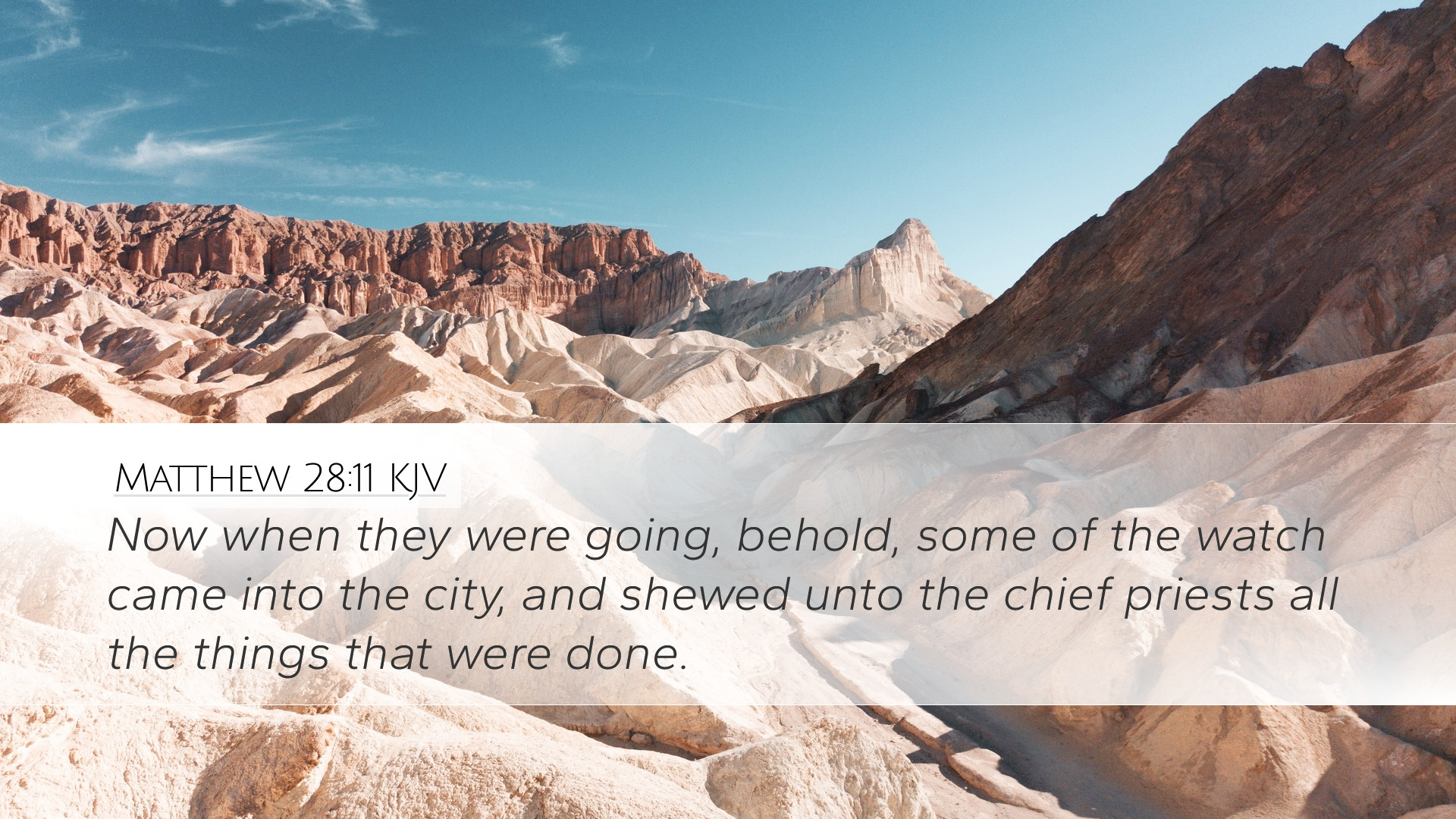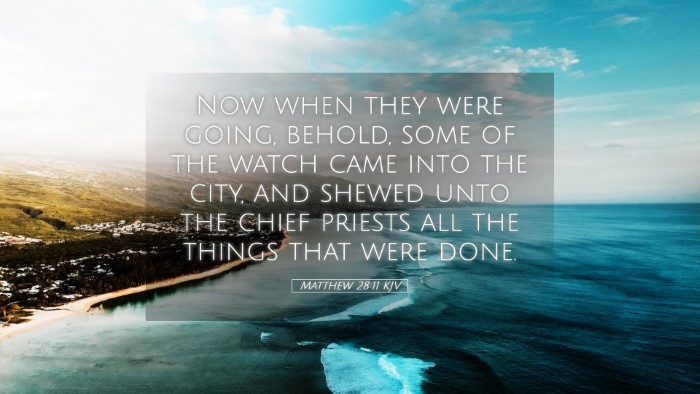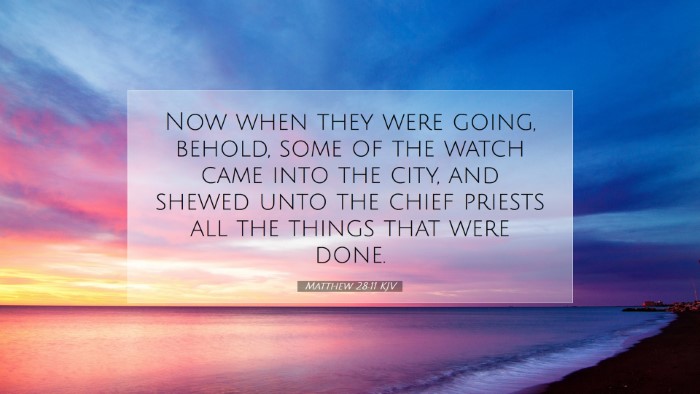Commentary on Matthew 28:11
Bible Verse: "While they were going, behold, some of the guard went into the city and told the chief priests all the things that had happened." (Matthew 28:11)
Introduction
The resurrection of Jesus Christ is not only the hallmark of Christian faith but also serves as a focal point for understanding the dynamics of belief and disbelief, the power of witness, and the importance of truth in the face of deception. Matthew 28:11 presents a pivotal narrative moment following this monumental event, shedding light on the responses of those who witnessed the resurrection first-hand.
Contextual Overview
In the preceding verses, we see the profound event of the resurrection, where Mary Magdalene and the other Mary encounter the angel at the tomb, who informs them that Jesus has risen (Matthew 28:1-10). This scene sets the stage for Matthew 28:11, where the psychological and sociopolitical ramifications of the resurrection begin to unfold through the actions of the guards assigned to protect the tomb.
Analysis of the Verse
1. The Guards' Experience: The narrative begins with "While they were going," indicating the guard’s immediate action after witnessing the angelic scene. The guards, likely overawed and terrified, leave the tomb to report their experience. This moment highlights the profound impact of the resurrection not merely on the disciples but also on those who were tasked with keeping the tomb secure.
2. The Reaction of the Chief Priests: The choice of the word "some" indicates diversity in response among the guards. This nuance suggests that not all may have understood the event the same way, which is significant when considered against the backdrop of religious authority represented by the chief priests. The guards’ report to the chief priests signifies a grave acknowledgment of the miraculous event, marking a pivotal moment that bridges the miraculous with human governance.
Theological Implications
1. Witness and Testimony: The role of the guards as witnesses is critical. Although they were not aligned with the faith of the disciples, they nonetheless became witnesses to the resurrection. This aspect raises meaningful discussions about the nature of witness and testimony in the faith community and the world at large. Their testimony to the authorities brings forth questions of truth and accountability.
2. Fear and Faith: The guards' initial fear reflects the power and glory of God revealed in the resurrection. This is a point emphasized in many commentaries, including Albert Barnes, who notes that divine power often invokes fear even among those not hostile to God. Such fear, however, is juxtaposed with the call to faith, and the differing responses to this momentous event reveal an ongoing tension between belief and skepticism.
Historical Context
The historical context surrounding Matthew 28:11 plays a significant role in understanding the implications of the guards' actions. The chief priests, who had conspired to obtain the crucifixion of Jesus, faced a potential crisis of authority and credibility. The report from the guards posed a significant threat to their control, making this moment pivotal not simply in the narrative of the resurrection but also in the evolving relationship between the early Church and Jewish leadership.
Insights from Commentators
Matthew Henry: In his commentary, Henry emphasizes the importance of truth over falsehood. He notes that the guards, irrespective of their motives, inadvertently became bearers of a message that bore witness to God's work. He suggests that their role serves as a reminder that even those opposed to the faith can play a part in God's overarching plan.
Albert Barnes: Barnes underscores the reaction of the guards as a contrast to the disciples' reaction. While the disciples were told to rejoice in Jesus’ resurrection, the guards took the news to the chief priests, showcasing a division born out of fear and misunderstanding. Barnes interprets this scenario as an essential commentary on the nature of belief and the human responses to divine revelations.
Adam Clarke: Clarke provides a detailed analysis of the implications of the guard's report. He assesses the broader consequences of their testimony on the Jewish leadership and how it reflects on the fulfillment of prophecy. He draws attention to the fate of the guards following their report, raising questions about their long-term accountability and consequences for their acknowledgment of the miraculous event.
Applications for Today
The narrative encapsulated in Matthew 28:11 serves as a powerful reminder for modern-day believers and leaders:
- Emphasizing Authentic Witness: Just as the guards bore witness to the miraculous, believers today are called to authentically share their experiences and understanding of God’s work in their lives.
- The Response to Fear: Fear can often hinder one’s response to divine truth. Understanding the guards' fear invites believers to confront their apprehensions about faith and to lean into the assurance provided by the resurrection.
- Accessibility of God's Truth: The fact that God's truth can emerge even from unexpected sources reminds current theologians and scholars to remain open to insights from all avenues, understanding that God's work can be witnessed outside preferred constructs.
- Authority and Accountability: The actions of the guards call contemporary leaders to reflect on how they respond to truth and authority, urging them to act with integrity in light of divine revelation.
Conclusion
Matthew 28:11 serves not only as a transitional verse in the story of the resurrection but also captures the complexity of human responses to divine truth. Through the lens of both traditional and contemporary understandings, we see the nuances of fear, authority, and belief interwoven in the fabric of this narrative. For pastors, students, and scholars alike, this verse invites deeper reflection on the nature of testimony, the dynamics of faith, and the relentless truth of the Gospel that calls us beyond our fears into a transformative relationship with the risen Christ.


